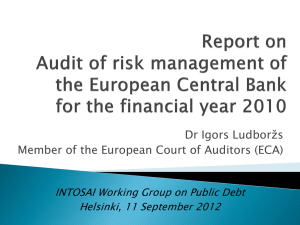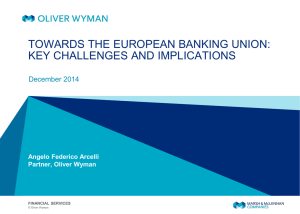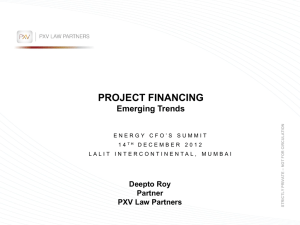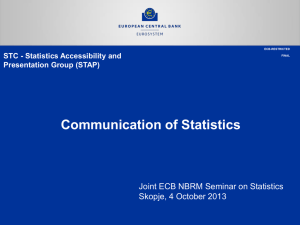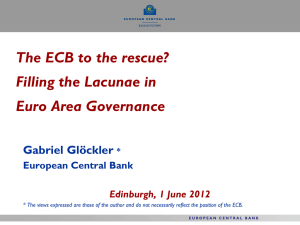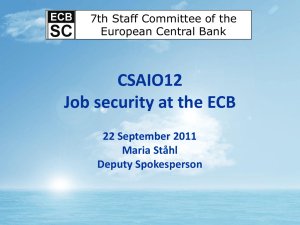FEMA, 1999.
advertisement
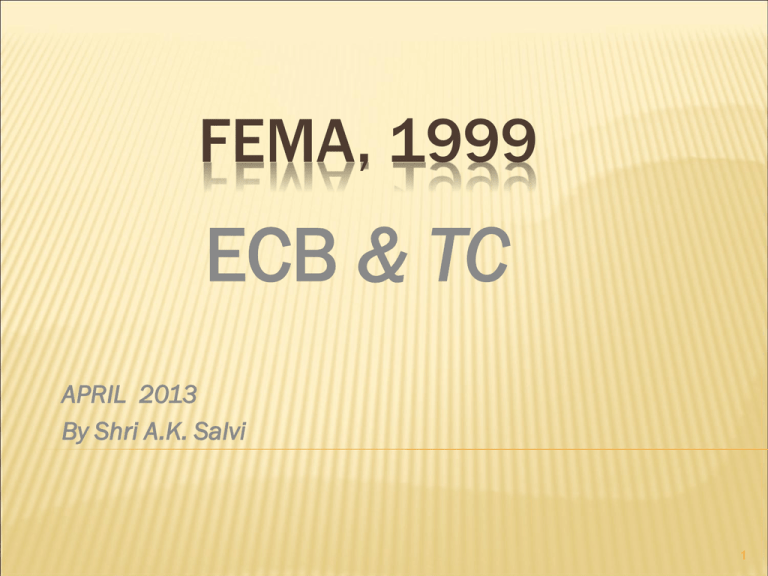
FEMA, 1999 ECB & TC APRIL 2013 By Shri A.K. Salvi 1 ECB POLICY India’s external debt includes external assistance, NRI deposits, short-term credits and rupee debt. ECBs are key components of external debt. The important aspect of ECB policy is to provide flexibility in borrowings by Indian corporates, at the same time maintaining prudent limits for total ECBs. Government decides the limit. The guiding principles for ECB policy are to keep maturities long, cost low and encourage infrastructure (9 areas) and export sector financing. 2 ECB POLICY CONTD.. ECB is an administered facility and has implications for the external sector of the country. As an administered policy certain amount of rationing of annual limit is necessitated for channelising the resources to prospective capital expenditure and asset built up. ECB is one of the major instruments of capital controls for regulating capital inflows. As per the current policy, overseas lenders are required to assume directly the project risk without credit support from domestic banks. Allowing banks to extend credit support for ECBs have implications for domestic financial stability. 3 ECBS.. ECBs & TCs are governed by : - Sec. 6 (3) (d) of FEMA; [ i.e. any borrowing or lending in foreign exchange in whatever form or by whatever name called ]. - Policy framed by Govt.; - Notf. No. FEMA. 3/2000 issued u/s 6 (3)(d); - Amendment to Notf. From time to time; - A. P. ( Dir Series) Cirs. Issued by RBI. 4 ACCESSION OF FUNDS FROM ABROAD.. ECBs : commercial loans in the form of bank loans/buyer’s credit/supplier’s credit/securitised instruments (FRN/FRB) with minimum average maturity of three years; FCCBs: FCCB&OS (Through Depository Receipt Mechanism) 1993; Preferance shares: NC/OC/PC ( funds received on or after 1-5-2007 ); FCEBs: FCEB Scheme 2008. FRN : Floating Rate Note FRB : Floating Rate Bond 5 ECB INCLUDES….. Commercial loans; Syndicated loans; Floating/Fixed rate notes/bonds; LoCs from foreign banks/financial institutions; Import loans; Loans from export credit agencies; Commercial loans from IFCI/ADB/CDC etc. TCs : BC/SC [ more than 3 yrs ]. 6 METHOD OF RAISING FUNDS.. Two Routes:- Automatic Route, and - Approval Route. For investment in real sector-industrial sector, infrastructure sector and service sectors ( Hotel/Hospital/Software) under Automatic Route. Individuals, Trusts and Non-profit making Organisations are not eligible to raise ECBs. In case of doubt about Automatic or Approval Route, the applicant may take recourse to Approval Route. 7 ECBS – NORMS RELATE TO… Eligible borrowers; Recognised lenders; Amount & maturity; All-in-cost ceilings; End-use; End-use not permitted; Guarantees; Security; Parking of ECB proceeds; Prepayment; Debt servicing; Refinancing of an existing ECB; Procedure. 8 INFRASTRUCTURE SECTOR DEFINED AS.. Power Telecommunication; Railways; Roads including bridges; Sea port & Air port; Industrial parks; Urban infrastructure ( water supply, sanitation & sewage projects); Mining, exploration and refining; Cold storage or cold room facility, including for farm level precooling, for preservation or storage of agricultural and allied produce, marine products and meat. 9 NORMS CONTD.. End use not permitted : - On lending ; - Investment in capital market; - Acquisition of a company ( full/part ); - Investment in Money Market Mutual Funds; - Real estate sector; - General corporate purpose; - Repayment of Rupee loan; and - Working capital requiremnet. 10 APPROVAL ROUTE COVERS… • Proposals covered under the Approval Route: - Cases not covered under Automatic Route; - ECB beyond 50% of NoF by FI classified as IFCs - Bks/Fis participated in the Textile or Steel sector restructuring; - ECBs with AVM of 5 yrs. By NBFCs from multilateral FI/reputable regional FIs/Export credit agencies/Intl. Banks to finance import of infrastructure instruments for leasing; - ECB by IFCs (NBFCs catagorised as IFCs) beyond 50% of NoF for on lending to IF sector ( compliance with DNBS guidelines and hedging); - FCCBs by HFCs ( 3 years NoF not less than Rs.500crs; listed on BSE/NSE ; minimum ECB of $100 mn. And submission of purpose / plan of utilisation) - SPVs or any other entity notified by RBI to finance IFCs; 11 APPRVAL ROUTE CONTD.. - Multi State Co-op. Soc. engaged in mfg. (financially solvent & having up-to-date B/S); - SEZs developers for providing infrastructure facilities within SEZ; - Corporates who have violated ECB policy and under investigation by RBI/DoE; - Service sector (Hosp/Hotel/Software) beyond $ 200 mn. Per F. Y. & AVM exceeding 5 yrs w.e.f. 26-09-2010; - Development of Integrated Township( was available up to 31-12-2010 ). - National Manufacturing Investment Zones (NMIZ) 12 PROCEDURE Automatic Route : - Loan agreement in compliance with ECB guidelines without prior approval of RBI; - Submission of Form 83, certified by CS/CA, through AD Bank to RBI [ DSIM ] for obtaining LRN before drawing down of ECB; - Drawing down of ECB only after LRN. Approval Route : Application in Form ECB to Co. RB, through AD Bank, for approval. After approval to follow automatic route procedure. 13 REPORTING REQUIREMENT Form-83 [to obtain LRN ]; Form-83 [change/modifications in the drawl/repayment schedule ] ECB-2 [ reporting of drawls – monthly basis ]; FC-GPR [ conversion of ECB into equity ]; Compliance of ECB Guidelines is the primary responsibility of the borrower; Any contravention need to be got compounded by applying to RBI; Before forwarding the ECB-2 return to RBI the Company Secretary/CA must scrutinise related original documents and ensure that the return is complete and is in order as per ECB Guidelines issued by RBI / Govt. 14 TRADE CREDIT (TC) TC refers to credit extended for imports directly by the overseas supplier, bank, FI, for maturity of less than 3 yrs. Depending on source, TC can be classified as: > Suppliers credit (SC); > Buyers credit (BC); BCs / SCs for 3 yrs and above are ECBs; All-in-cost: 6 months LIBOR + 350 bps and includes arrangers fee, upfront fee, management fee, handling/ processing fees, out of pocket and legal expenses if any. (w.e.f. 15.11.2011 until further review Cir 40/9-12-12). 15 TC : REPORTING.. Each TC may be given UID No. By AD. Ads to submit a consolidated statements for all their branches as under : - Monthly in Form TC [ approval, drawl, utilisation & repayment ] to DEAP. RBI; - Quarterly [issuance of LCs/Guarantees/LoU/ LoC to FED. RBI. 16 USUAL CONTRAVENTIONS... Contraventions of the provisions of FEMA by corporates & individuals are due to the acts of omissions & commissions of the AD Banks. Such contraventions dealt with by RB mainly relates to FEMA Notification. No. 3/2000 ; i) Draw down of ECB without LRN [ Reg. 3 & 6]; ii) Allowing drawn of ECB under automatic route from unrecognised lender, to in eligible borrower, for non permitted end uses, etc. [Reg.3 & 6 ]. 17 ECB CAN BE BLESSING BUT --FEW CONCERNS... Big question remains hanging over the future of interest rates; Rupee volatility : Forex risk is sharp; Cost effectiveness of ECB funds relative to domestic borrowing; Country rating [Baa3] : difficult to get finest rates; CAD : Unlikely to improve because of widening trade deficit, oil prices, affected earnings of software exports, lower expatriates' remittances, etc; Forward rates : Currently 6.5/7% [ cost 12/13%]; Corporates chose not to hedge [ e.g. FCCB redemption]. 18 Thanks!!! 19


